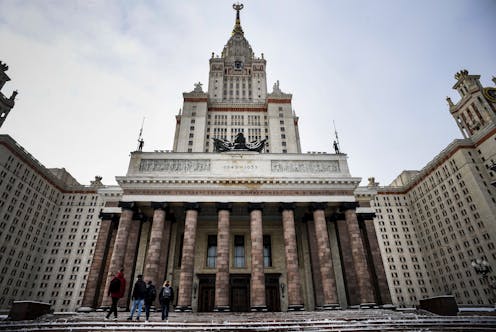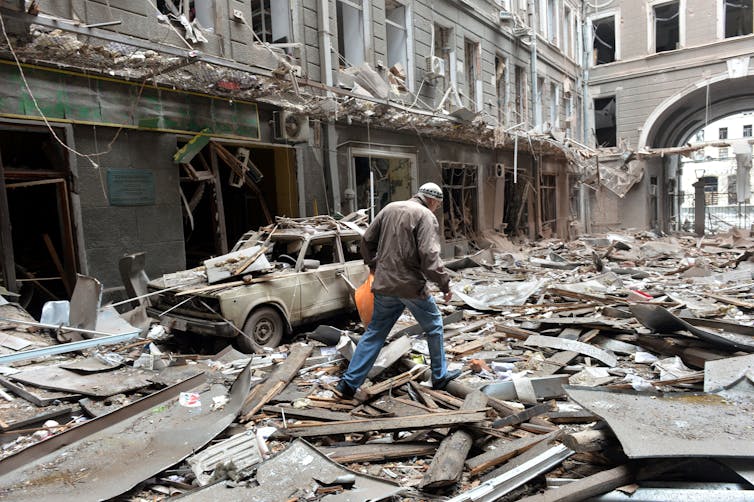
Since Russian President Vladimir Putin invaded Ukraine on Feb. 24, 2022, universities across Europe and the United States have condemned the war and cut ties with Russia altogether. In the following Q&A, Arik Burakovsky, an expert on relations between the U.S. and Russia, shines light on the future of cooperation between Russia and the West in the realm of higher education.
What kinds of ties have existed between Western and Russian universities?
Since the end of the Cold War in 1991, Western and Russian higher education institutions have formed hundreds of partnerships and cooperated on different initiatives. These activities have included academic exchanges, curriculum development, joint online courses and collaborative research projects.
Russia has worked over the past two decades to make its universities more prestigious. The Russian government internationalized and updated its higher education system. This meant moving away from Soviet traditions and adopting European higher education standards, particularly transitioning from the one-tier, five-year “specialist” degree to the two-tier “bachelor-master” system.
In their desire for global competitiveness, Russian universities built international branch campuses throughout former Soviet countries. They also offered more opportunities for Russian students to study abroad and attracted more international students. The number of foreign students in Russia nearly tripled, from 100,900 in the 2004-2005 academic year to 282,900 a decade later.
Russian universities have opened more courses taught in English and established joint- and dual-degree programs with Western universities in a variety of disciplines. For example, the Moscow School for the Social and Economic Sciences offers joint bachelor’s and master’s degree diplomas with the University of Manchester in the United Kingdom.
What have these relationships produced?
Western and Russian students have learned about each other’s cultures, languages and societies. Scientists in Russia and the West have worked together on research projects related to outer space exploration, particle physics, climate change, biodiversity in the Arctic and many other areas.
However, as geopolitical tensions grew over time, the Russian authorities became apprehensive about what they believed to be efforts “to educate young people in a pro-Western way, form a protest electorate and inculcate a hostile ideology.” Subsequently, Putin began to stifle international academic bonds by imposing restrictions on them.
Russia has dissolved academic connections with the West through legislation on so-called “foreign agents” and “undesirable organizations.” The government ramped up scrutiny of foreign funding and outlawed dozens of Western think tanks, charities, and universities that previously had worked in Russia. These banned organizations include the Atlantic Council, a nonpartisan international affairs think tank in Washington, D.C., and Bard College, a private liberal arts college in New York state.
In 2021, Russia banned all educational activities not approved by the government. This includes cooperation with foreign universities. Before Russian academics meet with foreign scholars, they must notify the government.
In my work at The Fletcher School of Law and Diplomacy at Tufts University since 2017, I have managed collaborative teaching, research and academic exchanges with universities and think tanks in Moscow, St. Petersburg and Vladivostok. I have seen students and experts in the two countries gain mutual understanding of international affairs by sharing diverse perspectives and learning from one another.
These interactions were formally ended by the university where I work on March 15, 2022, as they are now considered “morally unacceptable.”

Does Russia’s invasion of Ukraine threaten these relationships?
Yes. The Ukrainian government has called for an academic boycott of Russia. Many colleges have pulled students out of Russia. They have also paused scientific cooperation, cut financial ties and increased scrutiny of donations from Russia. These moves are all part of a global wave of condemnation against the invasion.
While many academic leaders have urged caution about moving too quickly, some American and European universities have already frozen their relationships with Russia completely. Universities in Estonia and Belgium collectively decided to suspend all ties with Russia.
The Massachusetts Institute of Technology ended its high-tech teaching and research cooperation with the Skolkovo Institute of Science and Technology in Moscow on Feb. 25. The partnership, which began in 2010, had been bolstered by a five-year extension and multimillion-dollar funding in 2019. Yet the program had been mired in controversy since 2018 over sponsorship from sanctioned oligarch Viktor Vekselberg.
Many European governments, such as Germany, the Netherlands, Denmark, Finland, Poland, Norway, Latvia and Lithuania, have asked their universities to cut ties with Russia entirely. The United Kingdom announced on March 27 that it will halt tens of millions of pounds in funding for all research projects with links to Russia.
What are the reasons given for and against severing ties?
Proponents claim these actions are needed to take a moral stance against Putin. They also say they are meant to fight corruption, reduce the risks of spying, block Putin’s propaganda machine and prevent technology theft. Chris Philp, the United Kingdom’s minister for technology and the digital economy, says he does not see how “anyone in good conscience can collaborate with Russian universities.”
Opponents argue that by shutting out Russian academia, the West is alienating Russian students and scholars and setting a bad precedent for international academic cooperation broadly. They maintain that scientific openness promotes democracy and human rights, helps counter misinformation inside Russia and encourages conflict resolution.
Lawrence Bacow, president of Harvard University, emphasizes the value of academic diplomacy. He points out that “individuals are not necessarily responsible for the policies of their governments.” On March 9, the university’s Davis Center for Russian and Eurasian Studies suspended its relationships with Russian universities whose administrations expressed support for the war.
How will these severed ties affect higher education in Russia?
By closing lines of communication with Russia, Western universities may be unwittingly aiding Putin’s efforts to isolate Russian students and academics. Putin wants to convince young people and academics, who tend to be more pro-Western and anti-authoritarian than the rest of the population, that there is no hope for them now that they are alone.
Russian researchers say they increasingly feel disconnected from the West and disheartened about the future of Russian science. The Russian government declared on March 22 that it will bar its researchers from participating in international conferences.
Are Russian academics free to condemn the invasion?
A climate of fear reigns over people in Russia who oppose the war. A new law punishes the spread of intentionally “fake” information about the military with up to 15 years in prison. In his televised speech on March 16, Putin vowed to cleanse Russia of pro-Western “scum and traitors,” setting the stage for a severe domestic crackdown.
Russian scholars are unable to criticize the invasion without risking employment terminations, fines and jail sentences. Saint Petersburg State University has expelled 13 students who were detained at anti-war protests. While more than 700 government-appointed Russian university presidents issued a statement of support for the “special military operation” in Ukraine, almost 8,000 Russian scholars voiced their opposition to the war in an open letter condemning the hostilities.
Hundreds of thousands of members of Russia’s liberal intelligentsia and political opposition fled the country in the wake of the war. They are afraid of political persecution and conscription. As room for free speech rapidly closes, some universities abroad have opened temporary teaching and research positions for Russian scholars in search of refuge.
[More than 150,000 readers get one of The Conversation’s informative newsletters. Join the list today.]
Arik Burakovsky works for The Fletcher School of Law and Diplomacy at Tufts University. He receives funding from Carnegie Corporation of New York.
This article was originally published on The Conversation. Read the original article.







